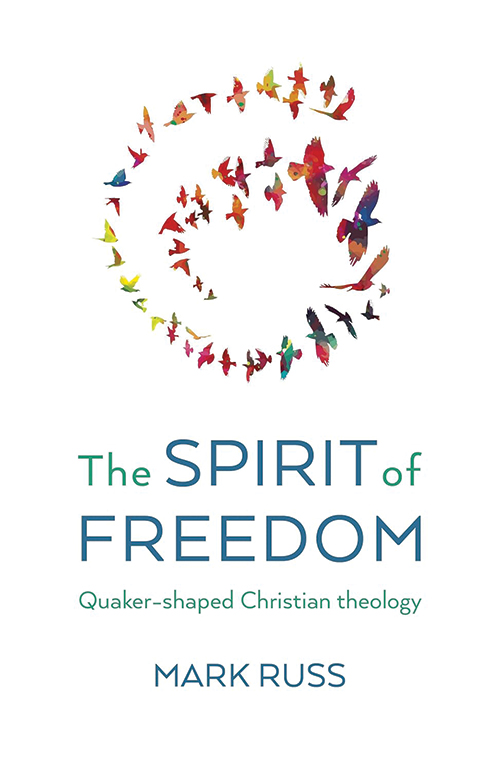
The Spirit of Freedom: Quaker-Shaped Christian Theology
Reviewed by Brian Drayton
August 1, 2025
By Mark Russ. Christian Alternative Books, 2024. 120 pages. $10.95/paperback; $5.99/eBook.
Sometimes I hear Friends say that Quakers don’t do theology, but in actuality, as Mark Russ points out in his latest book, theology is “a very ordinary activity and we do it all the time. We can’t escape it.” And for those who find that surprising or confusing, he offers this simple explanation: “When we attempt to make sense of the Divine and our relationship to it, we’re doing theology.” Indeed—just as by our actions, we are always giving testimony about what Quakerism is.
It is true that intentionally committing theology is viewed skeptically in many parts of Quakerdom, and reading formal theology is not so common a pastime among us—especially if there is a hint that the work claims to be “normative.” So it’s refreshing when Russ shares early on in The Spirit of Freedom that his ministry is theology (a ministry that emerged after years as a music teacher). “Since theology is something we all do,” he writes, “it’s useful to have people who can help us do it better. I feel called to be one of those people. Doing theology is how I serve my Quaker community.”
Russ is a British Liberal Friend who is also gay and Christian. He has been writing about Quaker theology for many years on his widely read blog, jollyquaker.com, which he started in 2013. The book is in effect a collection of posts from that blog; consequently, the 23 chapters are quite brief (typically two or three pages) and focused. Although Russ’s thought is informed by scholarship, the tone is non-academic and conversational.
Two introductory chapters lay out the aims and scope of the work; the rest are organized into three parts. In parts 1 and 2, Russ takes inspiration from the first 12 “Advices and Queries” found in Britain Yearly Meeting’s Faith and Practice, unpacking them one at a time. Following the presented order of these pithy yet theologically rich statements, he moves thematically from “speaking of, speaking to, knowing, and listening to God” to focusing on spiritual experience more directly in how Friends worship God, both the nature of it and how they actually do it and prepare for it. He also wrestles with the pluralism that is characteristic of modern Quakerism in matters of belief and practice.
Part 3 considers how Quakers are led to be “God’s witnesses,” and here Russ examines his own “whole life as a testimony” (an important part of that, he says, is “being an openly imperfect person”), in addition to offering commentary on a variety of topics, including what he calls “the Quakerly art of squashing” (essentially when someone offers up an idea or suggestion only to be “roundly stamped on”) and the inclusion of trans and non-binary people in our Quaker communities. For the record, he’s for it, and views their journeys of self-discovery as “inhabiting the important Quaker tradition of living the future now.”
Speaking of identity and inclusion, it’s noteworthy that Russ calls himself a “Quaker-shaped Christian,” a phrase he uses in the title of his prior book, Quaker Shaped Christianity. In some parts of Quakerdom, Christian Friends can struggle to find their place in the Quaker weave. Such Friends contribute to Quaker vitality when they are open about their experience that Christianity is a way, path, or frontier, rather than a dogma and terminus. In The Spirit of Freedom, Russ shows how freedom to doubt and question go hand in hand with the slow clarification of thought and commitment that characterizes authentic spiritual growth.
As with ministry in a meeting for worship, readers will take in the author’s words, testing them for how they may stimulate or nourish fresh life, as they recount moments of reflection and discovery: fresh openings in the author’s life. In this way, any Friend or meeting will benefit from hearing and working with Russ’s book, and the impacts will be as diverse as the Friends who are reading it. Theology is serviceable when it represents (and supports) encounter—meeting. This book does so.
Brian Drayton is a member of Weare (N.H.) Meeting, New England Yearly Meeting, and a Friends minister. His most recent book will appear in fall of 2025 from Inner Light Books of Barclay Press: The Gospel in the Anthropocene: Letters from a Quaker Naturalist.



Comments on Friendsjournal.org may be used in the Forum of the print magazine and may be edited for length and clarity.